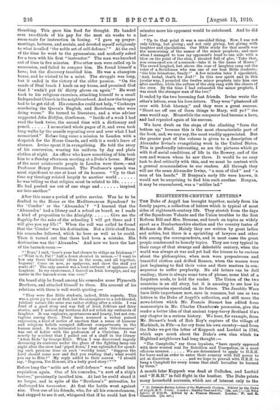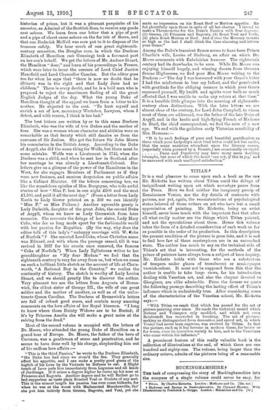EIGHTEENTH-CENTURY LETTERS.*
Tait Duke of Argyll has brought together, mainly from his family papers, a collection of letters -which is typical of most
sides of eighteenth-century life. They stretch from the days of the Squadrons Tolante and the Union troubles to the first Reform Bill and Mrs. 'lemons, and touch on topics as widely apart as a Dunbartonshire election and the country tastes of Madame de Staid. Mainly they are written by great ladies and nobles, but there is a sprinkling of lawyers and other folk among the correspondents, and in most cases the great people condescend to homely topics. They are very typical in their range of that strange and delectable century, when the world was always at war and yet had the leisure to be carious about the philosophies, when men wore preposterous and beautiful clothes and deified Reason, when the masses were just beginning to find their voice and their masters in con- sequence to suffer perplexity. No old letters can be dull reading ; there is always some turn of phrase, some hint of a forgotten mode, to hold the reader. The Union of the two countries is an old story, but it is amusing to see how its contemporaries speculated on its future. The Jacobite Wars have little importance now, save in romance, but one or two
letters in the Duke of Argyll's collection, and still more the news-letters which Mr. Francis Steuart has edited from manuscripts in Mr. Charles Chambers:s possession, give the
reader a better idea of that ancient topsy-turvy Scotland tl any chapter in a serious history. We hear, for example, from Mr. Steuart's book of Rob Roy's capture of the village of Markinch, in Fife—a far cry from his own country—and from the Duke we get the letter of lieppoch and Locbiel in 1746, which says much about the Duke's own clan which its Highland neighbours had long thought :—
"The Campbells," say these loyalists, "have openly appeared with their wonted zeal for Rebellion and Usurpation, in a most
officious manner We are determined to apply to H.R.H. for leave and an order to enter their country with full power to act at discretion and we hope to prevail with H.R.H. to bang a Campbell for every house that shall hereafter be burned by them."
A month later Keppoch was dead at Culloden, and Loeltiel and " in fall flight in the heather. The Duke prints many household accounts, which are of interest only to the
* (1) Intitiate Society Letters of the Eighteenth Century. Edited by the Duke of Argyll, K.T. 2 vols. London:. Stanley Paul and Co. [24e. net.]—(2) New. Letters of 1715-16. Edited by A. Francis Steuart. London: W. and B. Chanibers. Da. net.]
historian of prices, but it was a pleasant perquisite of his ancestor, as Admiral of the Scottish Seas, to receive any goods cast ashore. We learn from one letter that a pipe of port and a pipe of claret came ashore on the far isle of Barra, and
that. one Roderick McNeil was sore put to it to dispose of the treasure safely. We hear much of one great eighteenth century sensation, the Douglas case, in which the Duchess Elizabeth of Hamilton (née Gunning) took a foremost part on her son's behalf. We get the letters of Mr. Andrew Stuart,
the Hamilton "doer," and learn of his proceedings in France, which were later to incur the censure of Lord Chief Justice Mansfield and Lord Chancellor Camden. But the editor goes too far when he says that "there is now no doubt that he (Stuart) was in the right and that Lady Jane had no children." There is every doubt, and he is a bold man who is prepared to reject the unanimous finding of all the great English Judges of the day. What the young Duke of Hamilton thought of the appeal we learn from a letter to his mother. He objected to the cost. "To hurt myself and enrich a set of low, mercenary Wretches, Lawyers, whom I detest, and with reason, I think is too bad."
The best letters are written by or to this same Duchess Elizabeth, who was the wife of two Dukes and the mother of four. She was a woman whose character and abilities were as remarkable as that beauty which still dazzles us from the canvases of Sir Joshua. She got the future Sir John Moore his commission in the British Army. According to the Duke of Argyll, she did the same thing for Wolfe, but there must be some mistake. Wolfe was a Lieutenant in 1742, when the Duchess was a child, and when he met her in Scotland after her marriage he was already a Lieutenant-Colonel. Her letters give us a glimpse of the power of the Hamiltens in the West, for she engages Members of Parliament as if they were new footmen, and receives despatches on public affairs like a Cabinet Minister. Of the letters concerning her, we like the scandalous epistles of Mrs. Burgoyne, who tells awful stories of how "Miss P. lost in one night £500 and the next £1,500, and paid it all the next day." (From a letter from Lady North to Lady Gower printed on p. 309 we can identify "Miss P." as Miss Pelham.) Another agreeable gossip is
Lady Dalkeith, daughter of the great John, the second Duke of Argyll, whom we know as Lady Greenwich from later memoirs. She recounts the doings of her sister, Lady Mary Coke, who for so long made sport for -the fashionable world
with her passion for Royalties. (By the way, why does the editor talk of this lady's "unhappy marriage with W. Coke of Norfolk " ? She married Lord Coke, whose Christian name was Edward, and with whom the peerage ceased, till it was revived in 1837 for his cousin once removed, the famous "Coke of Norfolk.") When Lady Eglintoune writes to her granddaughter as "My dear Madam" we feel that the eighteenth century is very far away from us, but when we come on such a brilliant little sketch as the account of life at Chats- worth, "A Rational Day in the Country," we realise the continuity of history. The sketch is worthy of Lady Louisa Stuart, and we should greatly like to discover the author. Very pleasant too are the letters from Augusta of Bruns- wick, the eldest sister of George Ifl., the wife of one great soldier and the mother of another, as well as of the unfor- tunate Queen Caroline. The Duchess of Brunswick's letters are full of robust good sense, and contain many amusing comments on the love affairs of her Royal kinsmen. "1 long to know where those Dainty Widows are to be Buried; if it's by Princess Amelia she will make a great noise at the raising from the dead."
Most of the second volume is occupied with the letters of Dr. Moore, who attended the young Duke of Hamilton on a grand tour of Europe. Dr. Moore, the father of the hero of Corunna, was a gentleman of sense and penetration, and he seems to have done well by his charge, shepherding him out of his endless love affairs :— " This is the third Passion," he wrote to the Duchess Elizabeth,
the Duke has had since we cross'd the Sea. They generally affect his appetite, and I can make a pretty good guess of the highth of his Love by the Victuals he Refuses to eat. A Slight touch of Love puts him immediately from Legumes and all kinds of Jaaelieeze. If it arises a degree higher he turns up his nose at Fricasses and Ragouts. Another degree and he will Rather go to bed supperless as taste plain Roasted Veal or Poulets of any sort. This is the utmost length his passion has ever come hitherto, for when he was at the worst with Mada,moisel Marrhenville, tho' she put him intirely from Greens, Ragouts, and Veal, yet she
made no impression on his Roast Beef or Mutton appetite. He fed plentifully upon those in spite of all her charms. I intend to make a Thermometer for the Duke's Passion with four degrees: (1) Greens, (2) Fricasses and Ragouts, (3) Roast Veal and fowls, (4) plain Roast Mutton or Beef. And if ever the Mercury mounts so high as the last I shall think the Case alarming and inform your Grace."
Among the Duke's transient flames seems to have been Prince Charlie's wife, Louise of Stolberg, an affair on which Dr.
Moore comments with Rabelaisian humour. The eighteenth century had its drawbacks, to be sure. While Dr. Moore was enjoying himself hugely, and winning ducats from German Serene Highnesses, we find poor Mrs. Moore writing to the Duchess The day I was honoured with your Grace's letter I had the misfortune to lose my Infant, and tho' penetrated with gratitude for the obliging manner in which your Grace expressed yourself, My health and spirits were both so much affected that I was unable to make any return at that time." It is a horrible little glimpse into the meaning of eighteenth- century class distinctions. With the later letters we are almost clear of the century, for Lord John Campbell, to whom most of them are addressed, was the father of the late Duke of Argyll, and in the hectic and high-flying French of Madame de Steel, the chief correspondent, we find the note of a new age. We end with the guileless early Victorian sensibility of Mrs. Hemans
"It is by such feelings of pure and beautiful gratification as these which your Ladyship's most kind letter could not but excite, that the many anxieties attendant upon the literary career, (especially when pursued by a Female,) are occasionally overpaid.
Fame and Popularity may have many more dazzling triumphs, but none of which the heart 'can ask, if this be joy,' and be answered with such unalloyed satisfaction."







































 Previous page
Previous page